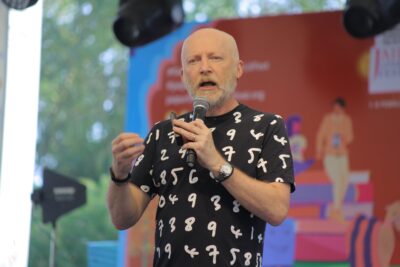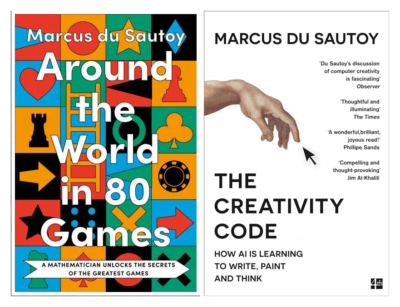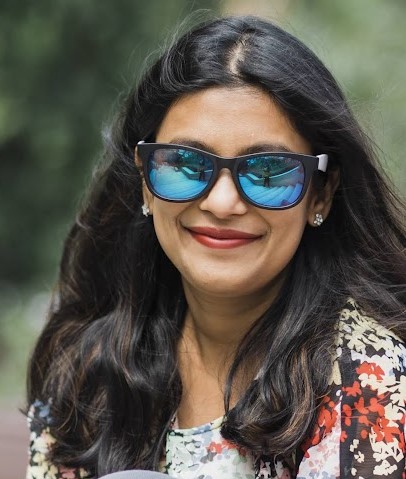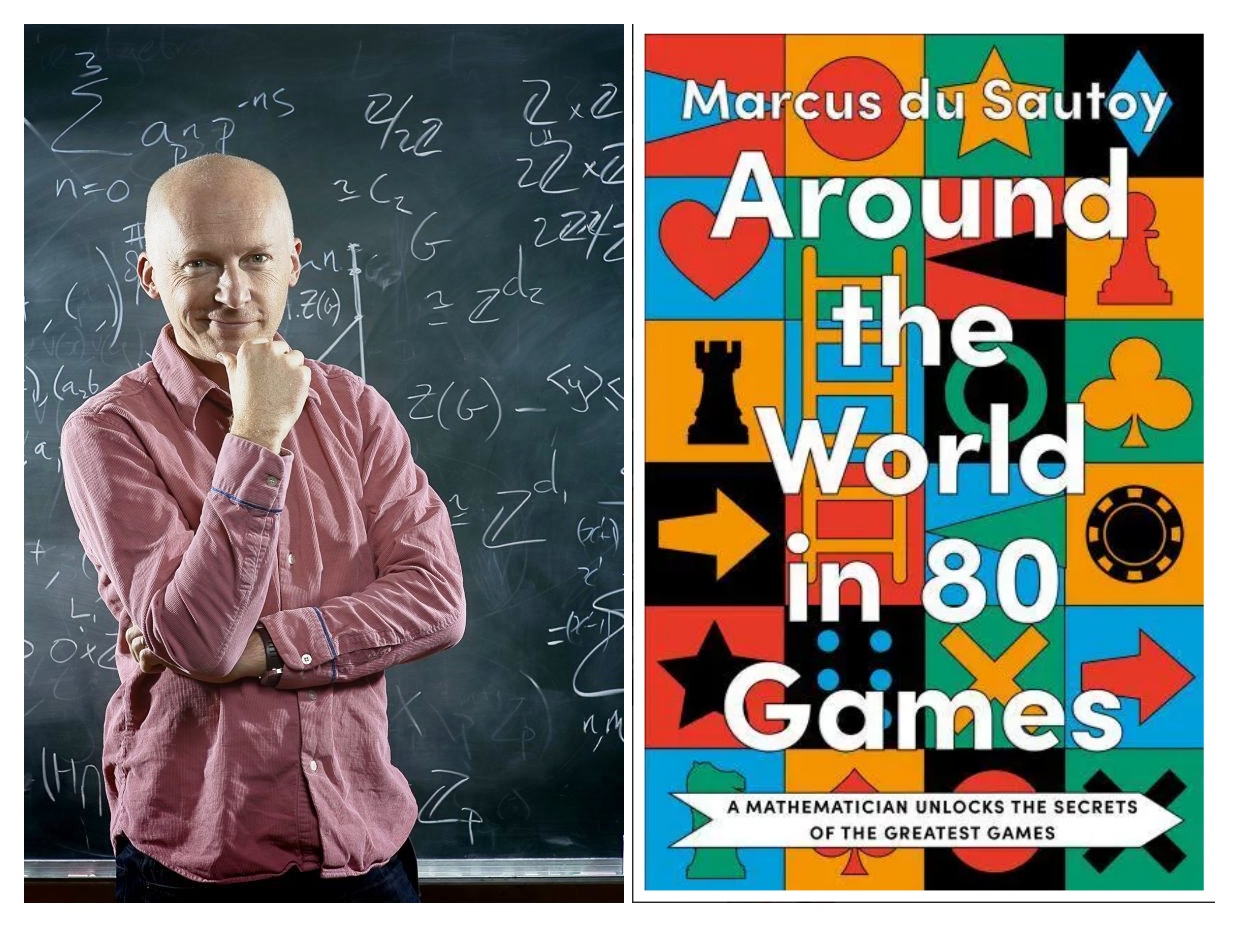
Marcus du Sautoy is a Professor of Mathematics at the University of Oxford and is widely known for his work in popularizing mathematics. He appears regularly in the media and has written numerous academic articles and popular books on mathematics. Anuja Agarwal caught up with him at the “Samsung Galaxy Tab S9 Series Jaipur Literature Festival”, where he was promoting his latest “Around the World in Eighty Games” and “The Creativity Code”.
Did you have a childhood dream to write, and have your childhood and upbringing influenced your writing today?
I didn’t have a childhood dream to write because I found writing very difficult, and I wasn’t a big reader either. As a kid, I was hopeless at spelling, and that was always very important in writing- you got bad marks if you misspelt words. Fortunately, today we have spellcheck, so that’s not so much a problem, but I sort of came to writing quite late as I did with reading. So it’s interesting. I liked playing games as a child.
Everybody’s childhood and upbringing involve defining moments which change the direction you go in. So for me, I had a teacher at my school, a maths teacher who showed me interesting mathematics that wasn’t on the curriculum related to Fibonacci numbers, prime numbers, infinity and geometry. And for me, that was a big defining moment that made me fall in love with doing mathematics. So yeah, I think I owe that teacher a lot for the direction I went in.
Marcus, for many people, maths and literature normally don’t intersect. I’m curious to know how that came about for you. How did you go from numbers to writing?
Originally, I didn’t think that mathematics and literature had anything to do with each other, but as I became a mathematician, I realized that mathematicians are storytellers. It’s just that our characters are numbers, geometry and logical ideas. Actually, the mathematics that we enjoy are ones that have moments of jeopardy or surprise! Two people actually turn out to be the same thing. So, I think once I realized that we had stories to tell, then I wanted to tell people who didn’t have the language of mathematics some of these stories. So then, I started to develop a way of telling mathematical stories without equations.
That’s wonderful. How did you shortlist the games to include in your new book “Around the World in 80 Games”?
The games I chose are games that I love and that I’ve encountered as I’ve gone around the world. Some of them are surprising. Some are very popular games. It certainly will exclude some games that people might say, why isn’t this game in there? So it’s my own personal choice of games, and, and I wanted a bit of variety of location and history and story. So, it’s not just a list of 80 games -It’s very much a journey, and there’s philosophy AND psychology of games included. So not everything is actually, you know, legally a game, I would say. The book has a mix of games and the psychology of many games. So it’s got variety.
Which games are your favourite among them?
I’ve got three favourites. So I’ve got an ancient game, which is my favourite, which is backgammon, which probably relates to the first board game ever (which is a racing game). Among modern games, I love The Settlers of Catan, which I think has a lot of the things that I’m looking for in a good game. My third choice is a futuristic game that we don’t know how to play, which is a game in a novel, and it’s called The Glass Bead Game. We don’t know how to play that, but these are my three favourite games.
“The Creativity Code”, your earlier book, explored the role of artificial intelligence in the creative process. What do you think about deep-fakes and the recent incident that happened in the US?
The thing is that AI is very good at picking up patterns. And so if you give it a lot of examples of something, it can understand what the pattern behind that is, and therefore, it can replicate it very often. So that is why it is very successful at creating things that look very convincing, like seeing the Pope in Gucci. You know, everyone thought that was real. Now everyone is obviously very worried because you can make anything. You can make somebody say something that they’ve never said. For example, I had a lot of problems last year with my voice, and I got an AI to train on lots of recordings that I’d done for the BBC. And I created my own voice as an AI, and then I could type what I wanted to say and AI would say it in the style of Marcus du Sautoy. So, there are opportunities with AI. That was very helpful for me because it helped me at a time when my voice was very weak. Obviously, there are great fears, but I think we have to remember AI is a two-edged sword, so if it can make fakes, it can very often spot fakes. So probably when humans are like, wow, I thought that was the real Pope and the real Gucci, the AI will be able to detect what is and what’s not.

What’s your favourite book genre and your favourite book?
That’s a very interesting question. Well, my favorite book is The Glass Bead Game, which is the eightieth game in my “Around the World in 80 Games”. I quite like European literature, and seem to always love books, which I read in translation, but I don’t think I have a very specific genre of books I enjoy particularly. I’m very open to historical fiction and modern-day fiction as well. I love Ian McEwan’s book Machines Like Me, for example. But I’m not a big science fiction fan, though there are a few books which I include in “Around the World in 80 Games”, such as The Player of Games, which is another science fiction story about a futuristic game which I also put in the book. I’m very open to reading lots of different things.
The last book you read?
The Betrayals- it’s for someone who also loved The Glass Bead Game, and it’s almost like Harry Potter meets the Glass Bead Game. So it’s set in a sort of school which is playing a game which is very like the Glass Bead Game. Now I was very nervous because if somebody writes a book sort of based on your favourite book, you’re either going to love it or you’re going to hate it. I was really impressed with the book, and it has lots of interesting twists and turns.
Is Marcus du Sautoy a big Harry Potter fan? What do you think about Quidditch?
Quidditch almost got in the book “Around the World in 80 Games”. Most of the games are not physical; they are mental or board games. But I put in one game, which is played in Guatemala, by the ancient Mayans, which is a hoop which you have to knock a ball through. So people may know it from the movies- they play it in one of the Disney films, I think, or the Pixar films. But anyway I think there’s some evidence that JK Rowling used that as a model for Quidditch, that she based it on this. But, of course, it doesn’t involve broomsticks.
So, what are you working on next?
I’m working on a new book which is called “Blueprints”. The idea is inspired by the fact that many creative artists use structures in what they make, whether they be composers, visual artists, architects or even choreographers. Quite often, those structures are mathematical in nature, but they don’t realize it. So, they often create mathematics or discover mathematics without knowing it. And so, my new book is about exploring these, what I call the blueprints, the structures that are in a lot of visual artists’ work. I’ve done a lot of work in the past between artists and mathematics. And so it’s telling some of these stories.
This brings me to my last question: what message would you like to send out to young readers?
Choose the things that you enjoy reading. Don’t choose the things that people tell you, you should read because reading is about enjoying yourself and getting lost in someone else’s world. But every now and then do try out new genres because reading is also about taking risks. And that is also true of the subjects that you choose in university –choose the thing you love doing, not the thing that you think will be useful – that will come later.
- Marcus du Sautoy is a British mathematician and Professor at Oxford University. He is also the author of popular mathematics and science books. In 1996, he was awarded the title of distinction of Professor of Mathematics.

Anuja Agarwal
Anuja Agarwal, along with her extensive banking experience, is also an avid reader, hiker and a hands-on mom of 3 kids. She is passionate about financial literacy and gender lens investment.
